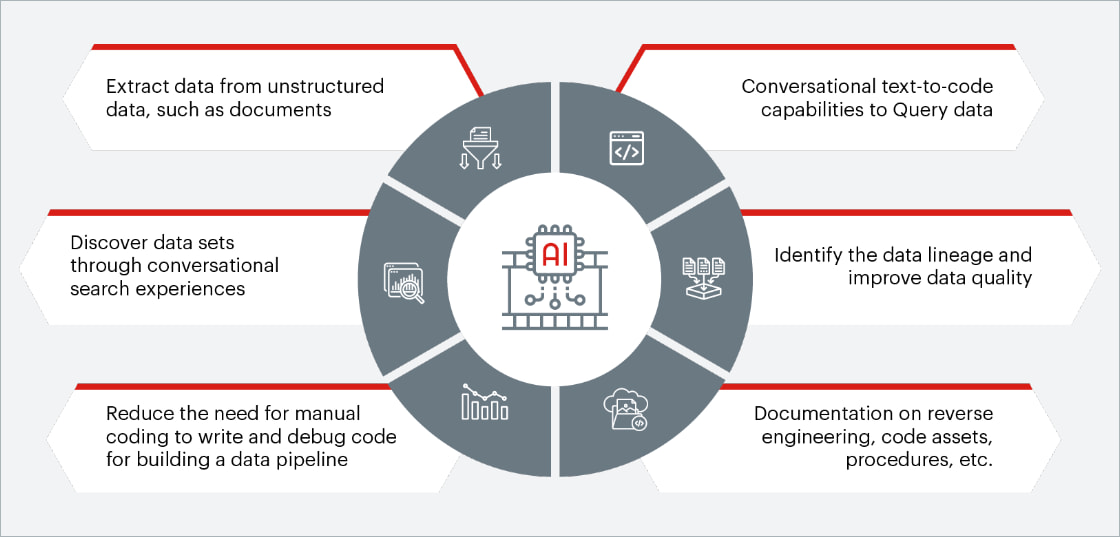The Transformative Role of Generative AI in Data Engineering
Reading Time: 3 minutes

Generative AI holds immense potential for businesses, offering a plethora of opportunities for growth and innovation. It is starting to make steady inroads into transforming various business use cases, such as personalized marketing, chatbots & virtual assistants, financial analysis, image and music synthesis, to name a few.
Large Language Models (LLMs)
One notable advancement in the field of Generative AI is the development of Large Language Models (LLMs). A large language model is a type of neural network that learns, summarizes, and generates content based on statistical calculations about how words relate to one another. Based on this, new conversational paradigms are changing the way we ask questions and retrieve information. LLMs can be a powerful productivity enhancer and the potential they have is being recognized across industries. These advancements have opened up endless possibilities for accelerating the transformation of enterprise data into actionable insights.
As organizations grapple with vast amounts of data pouring in from diverse sources, the need for efficient data processing, analysis, and transformation has become paramount. Traditional data engineering approaches are often overwhelmed by the sheer volume and complexity of this data. However, Generative AI has emerged as a game-changer in the field of data engineering.
Rapid adoption of Generative AI for data management
Generative AI has opened up a realm of possibilities, enabling data engineers to streamline processes, enhance data quality, and fuel innovation like never before. In this blog we look at some recent news and events that bring to light the growing adoption of Generative AI in data engineering.
- Informatica, has fully embraced Generative AI with its product called Claire GPT. This integration enables users to leverage the capabilities of LLMs and Generative AI for data management tasks, resulting in a significant 80% speedup.
- Tableau has also recognized the potential of Generative AI and has introduced Tableau GPT. By integrating Generative AI capabilities within their platform, Tableau empowers users to explore and analyze data more effectively, unlocking new insights and possibilities.
- The trend of acquisitions in the Generative AI space further highlights its growing importance in data engineering. Snowflake recently acquired Neeva, a company that leverages Generative AI to provide users with innovative ways to query and discover data.
- Databricks, acquired MosaicML, a leading Generative AI platform. This acquisition strengthens Databricks’ offering by combining their unified platform with MosaicML’s Generative AI training capabilities, providing enterprises with a robust platform for a wide range of AI use cases.
- Another notable development is TimeXtender’s introduction of XPilot, an AI-powered chat assistant for data integration. By harnessing the power of Generative AI, XPilot streamlines data integration processes and improves overall efficiency, making it an invaluable tool for data engineers.
In addition to these advancements, illumex, a data catalog company, has launched a GPT-based AI Assistant for Data Governance & Self-Service Discovery. This AI assistant, powered by Generative AI, facilitates effective data governance and enables users to discover and understand their data more efficiently, enhancing overall data management practices.
Code Interpreter for ChatGPT
Recently, OpenAI has launched Code Interpreter plugin for ChatGPT Plus users. This plugin acts as a bridge between human language and code, enabling users to understand and interact with programming languages more effectively. Some of the noteworthy use cases for the Code Interpreter plugin include:
- Data extraction from various file formats
- Solving quantitative and qualitative mathematical problems
- Performing data analysis
- Summarizing data with apt visualization
- Converting files between formats to cater to different user and system requirements.
Key data engineering use cases with Generative AI
There are several use cases of Generative AI in data engineering that are gaining popularity and even vendors of data products are directing their efforts to implement features like:

Conclusion
Generative AI is revolutionizing the field of data engineering, offering unprecedented opportunities to streamline processes, enhance data quality, and fuel innovation. In our next blog we will see where and how Generative AI can be leveraged as part of Data lifecycle management from Data Ingestion to DataOps. While the opportunities look limitless with Generative AI and LLMs, it must be worked through proper governance structure to handle inherent risks on data privacy, data quality, IP and bias. A domain-specific training approach, prompt engineering, and appropriate data governance programs should be holistically looked at to mitigate errors and associated risks.
About the Author
Gunasekaran S is the director of data engineering at Sigmoid and with over 20 years of experience in consulting, system integration and big data technologies. As an advisor to customers on data strategy, he helps in the design and implementation of modern data platforms for enterprises in the Retail, CPG, BFSI and Travel domain to drive them towards becoming a data-centric organization.
Featured blogs
Subscribe to get latest insights
Talk to our experts
Get the best ROI with Sigmoid’s services in data engineering and AI
Featured blogs
Talk to our experts
Get the best ROI with Sigmoid’s services in data engineering and AI



